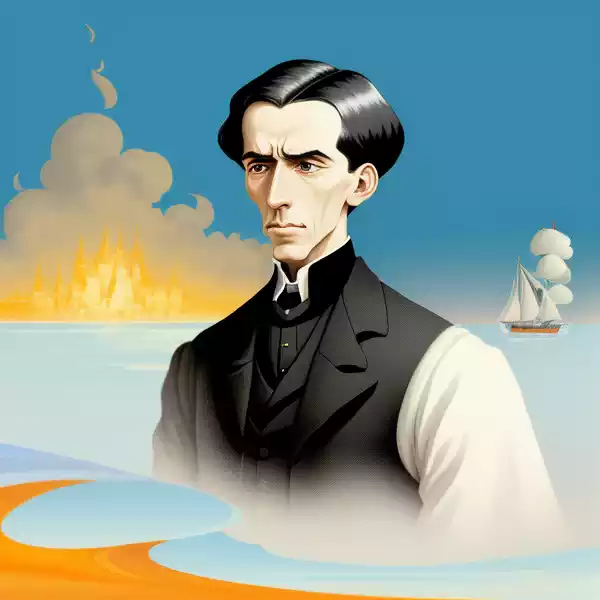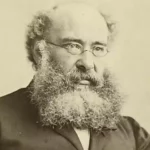 | |
George Walker at Suez | |
| Author | Anthony Trollope |
|---|---|
| Published |
1844
|
| Language | English |
| Nationality | British |
| Genre | Social Commentary, Victorian Literature |
1844 Short Story
George Walker at Suez
George Walker at Suez is an English Social Commentary, Victorian Literature short story by British writer Anthony Trollope. It was first published in 1844.
George Walker at Suez
by Anthony Trollope
Of all the spots on the world’s surface that I, George Walker, of Friday Street, London, have ever visited, Suez in Egypt, at the head of the Red Sea, is by far the vilest, the most unpleasant, and the least interesting. There are no women there, no water, and no vegetation. It is surrounded, and indeed often filled, by a world of sand. A scorching sun is always overhead; and one is domiciled in a huge cavernous hotel, which seems to have been made purposely destitute of all the comforts of civilised life. Nevertheless, in looking back upon the week of my life which I spent there I always enjoy a certain sort of triumph;–or rather, upon one day of that week, which lends a sort of halo not only to my sojourn at Suez, but to the whole period of my residence in Egypt.
I am free to confess that I am not a great man, and that, at any rate in the earlier part of my career, I had a hankering after the homage which is paid to greatness. I would fain have been a popular orator, feeding myself on the incense tendered to me by thousands; or failing that, a man born to power, whom those around him were compelled to respect, and perhaps to fear. I am not ashamed to acknowledge this, and I believe that most of my neighbours in Friday Street would own as much were they as candid and open-hearted as myself.
It is now some time since I was recommended to pass the first four months of the year in Cairo because I had a sore-throat. The doctor may have been right, but I shall never divest myself of the idea that my partners wished to be rid of me while they made certain changes in the management of the firm. They would not otherwise have shown such interest every time I blew my nose or relieved my huskiness by a slight cough;–they would not have been so intimate with that surgeon from St. Bartholomew’s who dined with them twice at the Albion; nor would they have gone to work directly that my back was turned, and have done those very things which they could not have done had I remained at home. Be that as it may, I was frightened and went to Cairo, and while there I made a trip to Suez for a week.
I was not happy at Cairo, for I knew nobody there, and the people at the hotel were, as I thought, uncivil. It seemed to me as though I were allowed to go in and out merely by sufferance; and yet I paid my bill regularly every week. The house was full of company, but the company was made up of parties of twos and threes, and they all seemed to have their own friends. I did make attempts to overcome that terrible British exclusiveness, that noli me tangere with which an Englishman arms himself; and in which he thinks it necessary to envelop his wife; but it was in vain, and I found myself sitting down to breakfast and dinner, day after day, as much alone as I should do if I called for a chop at a separate table in the Cathedral Coffee-house. And yet at breakfast and dinner I made one of an assemblage of thirty or forty people. That I thought dull.
But as I stood one morning on the steps before the hotel, bethinking myself that my throat was as well as ever I remembered it to be, I was suddenly slapped on the back. Never in my life did I feel a more pleasant sensation, or turn round with more unaffected delight to return a friend’s greeting. It was as though a cup of water had been handed to me in the desert. I knew that a cargo of passengers for Australia had reached Cairo that morning, and were to be passed on to Suez as soon as the railway would take them, and did not therefore expect that the greeting had come from any sojourner in Egypt. I should perhaps have explained that the even tenor of our life at the hotel was disturbed some four times a month by a flight through Cairo of a flock of travellers, who like locusts eat up all that there was eatable at the Inn for the day. They sat down at the same tables with us, never mixing with us, having their separate interests and hopes, and being often, as I thought, somewhat loud and almost selfish in the expression of them. These flocks consisted of passengers passing and repassing by the overland route to and from India and Australia; and had I nothing else to tell, I should delight to describe all that I watched of their habits and manners–the outward bound being so different in their traits from their brethren on their return. But I have to tell of my own triumph at Suez, and must therefore hasten on to say that on turning round quickly with my outstretched hand, I found it clasped by John Robinson.
“Well, Robinson, is this you?” “Holloa, Walker, what are you doing here?” That of course was the style of greeting. Elsewhere I should not have cared much to meet John Robinson, for he was a man who had never done well in the world. He had been in business and connected with a fairly good house in Sise Lane, but he had married early, and things had not exactly gone well with him. I don’t think the house broke, but he did; and so he was driven to take himself and five children off to Australia. Elsewhere I should not have cared to come across him, but I was positively glad to be slapped on the back by anybody on that landing-place in front of Shepheard’s Hotel at Cairo.
I soon learned that Robinson with his wife and children, and indeed with all the rest of the Australian cargo, were to be passed on to Suez that afternoon, and after a while I agreed to accompany their party. I had made up my mind, on coming out from England, that I would see all the wonders of Egypt, and hitherto I had seen nothing. I did ride on one day some fifteen miles on a donkey to see the petrified forest; but the guide, who called himself a dragoman, took me wrong or cheated me in some way. We rode half the day over a stony, sandy plain, seeing nothing, with a terrible wind that filled my mouth with grit, and at last the dragoman got off. “Dere,” said he, picking up a small bit of stone, “Dis is de forest made of stone. Carry that home.” Then we turned round and rode back to Cairo. My chief observation as to the country was this–that whichever way we went, the wind blew into our teeth. The day’s work cost me five-and-twenty shillings, and since that I had not as yet made any other expedition. I was therefore glad of an opportunity of going to Suez, and of making the journey in company with an acquaintance.
At that time the railway was open, as far as I remember, nearly half the way from Cairo to Suez. It did not run four or five times a day, as railways do in other countries, but four or five times a month. In fact, it only carried passengers on the arrival of these flocks passing between England and her Eastern possessions. There were trains passing backwards and forwards constantly, as I perceived in walking to and from the station; but, as I learned, they carried nothing but the labourers working on the line, and the water sent into the Desert for their use. It struck me forcibly at the time that I should not have liked to have money in that investment.
Well; I went with Robinson to Suez. The journey, like everything else in Egypt, was sandy, hot, and unpleasant. The railway carriages were pretty fair, and we had room enough; but even in them the dust was a great nuisance. We travelled about ten miles an hour, and stopped about an hour at every ten miles. This was tedious, but we had cigars with us and a trifle of brandy and water; and in this manner the railway journey wore itself away. In the middle of the night, however, we were moved from the railway carriages into omnibuses, as they were called, and then I was not comfortable. These omnibuses were wooden boxes, placed each upon a pair of wheels, and supposed to be capable of carrying six passengers. I was thrust into one with Robinson, his wife and five children, and immediately began to repent of my good-nature in accompanying them. To each vehicle were attached four horses or mules, and I must acknowledge that as on the railway they went as slow as possible, so now in these conveyances, dragged through the sand, they went as fast as the beasts could be made to gallop. I remember the Fox Tally-ho coach on the Birmingham road when Boyce drove it, but as regards pace the Fox Tally-ho was nothing to these machines in Egypt. On the first going off I was jolted right on to Mrs. R. and her infant; and for a long time that lady thought that the child had been squeezed out of its proper shape; but at last we arrived at Suez, and the baby seemed to me to be all right when it was handed down into the boat at Suez.
The Robinsons were allowed time to breakfast at that cavernous hotel–which looked to me like a scheme to save the expense of the passengers’ meal on board the ship–and then they were off. I shook hands with him heartily as I parted with him at the quay, and wished him well through all his troubles. A man who takes a wife and five young children out into a colony, and that with his pockets but indifferently lined, certainly has his troubles before him. So he has at home, no doubt; but, judging for myself, I should always prefer sticking to the old ship as long as there is a bag of biscuits in the locker. Poor Robinson! I have never heard a word of him or his since that day, and sincerely trust that the baby was none the worse for the little accident in the box.
And now I had the prospect of a week before me at Suez, and the Robinsons had not been gone half an hour before I began to feel that I should have been better off even at Cairo. I secured a bedroom at the hotel–I might have secured sixty bedrooms had I wanted them– and then went out and stood at the front door, or gate. It is a large house, built round a quadrangle, looking with one front towards the head of the Red Sea, and with the other into and on a sandy, dead-looking, open square. There I stood for ten minutes, and finding that it was too hot to go forth, returned to the long cavernous room in which we had breakfasted. In that long cavernous room I was destined to eat all my meals for the next six days. Now at Cairo I could, at any rate, see my fellow-creatures at their food. So I lit a cigar, and began to wonder whether I could survive the week. It was now clear to me that I had done a very rash thing in coming to Suez with the Robinsons.
Somebody about the place had asked me my name, and I had told it plainly–George Walker. I never was ashamed of my name yet, and never had cause to be. I believe at this day it will go as far in Friday Street as any other. A man may be popular, or he may not. That depends mostly on circumstances which are in themselves trifling. But the value of his name depends on the way in which he is known at his bank. I have never dealt in tea spoons or gravy spoons, but my name will go as far as another name. “George Walker,” I answered, therefore, in a tone of some little authority, to the man who asked me, and who sat inside the gate of the hotel in an old dressing-gown and slippers.
That was a melancholy day with me, and twenty times before dinner did I wish myself back at Cairo. I had been travelling all night, and therefore hoped that I might get through some little time in sleeping, but the mosquitoes attacked me the moment I laid myself down. In other places mosquitoes torment you only at night, but at Suez they buzz around you, without ceasing, at all hours. A scorching sun was blazing overhead, and absolutely forbade me to leave the house. I stood for a while in the verandah, looking down at the few small vessels which were moored to the quay, but there was no life in them; not a sail was set, not a boatman or a sailor was to be seen, and the very water looked as though it were hot. I could fancy the glare of the sun was cracking the paint on the gunwales of the boats. I was the only visitor in the house, and during all the long hours of the morning it seemed as though the servants had deserted it.
I dined at four; not that I chose that hour, but because no choice was given to me. At the hotels in Egypt one has to dine at an hour fixed by the landlord, and no entreaties will suffice to obtain a meal at any other. So at four I dined, and after dinner was again reduced to despair.
I was sitting in the cavernous chamber almost mad at the prospect of the week before me, when I heard a noise as of various feet in the passage leading from the quadrangle. Was it possible that other human beings were coming into the hotel–Christian human beings at whom I could look, whose voices I could hear, whose words I could understand, and with whom I might possibly associate? I did not move, however, for I was still hot, and I knew that my chances might be better if I did not show myself over eager for companionship at the first moment. The door, however, was soon opened, and I saw that at least in one respect I was destined to be disappointed. The strangers who were entering the room were not Christians–if I might judge by the nature of the garments in which they were clothed.
The door had been opened by the man in an old dressing-gown and slippers, whom I had seen sitting inside the gate. He was the Arab porter of the hotel, and as he marshalled the new visitors into the room, I heard him pronounce some sound similar to my own name, and perceived that he pointed me out to the most prominent person of those who then entered the apartment. This was a stout, portly man, dressed from head to foot in Eastern costume of the brightest colours. He wore, not only the red fez cap which everybody wears– even I had accustomed myself to a fez cap–but a turban round it, of which the voluminous folds were snowy white. His face was fat, but not the less grave, and the lower part of it was enveloped in a magnificent beard, which projected round it on all sides, and touched his breast as he walked. It was a grand grizzled beard, and I acknowledged at a moment that it added a singular dignity to the appearance of the stranger. His flowing robe was of bright colours, and the under garment which fitted close round his breast, and then descended, becoming beneath his sash a pair of the loosest pantaloons–I might, perhaps, better describe them as bags–was a rich tawny silk. These loose pantaloons were tied close round his legs, above the ankle, and over a pair of scrupulously white stockings, and on his feet he wore a pair of yellow slippers. It was manifest to me at a glance that the Arab gentleman was got up in his best raiment, and that no expense had been spared on his suit.
And here I cannot but make a remark on the personal bearing of these Arabs. Whether they be Arabs or Turks, or Copts, it is always the same. They are a mean, false, cowardly race, I believe. They will bear blows, and respect the man who gives them. Fear goes further with them than love, and between man and man they understand nothing of forbearance. He who does not exact from them all that he can exact is simply a fool in their estimation, to the extent of that which he loses. In all this, they are immeasurably inferior to us who have had Christian teaching. But in one thing they beat us. They always know how to maintain their personal dignity.
Look at my friend and partner Judkins, as he stands with his hands in his trousers pockets at the door of our house in Friday Street. What can be meaner than his appearance? He is a stumpy, short, podgy man; but then so also was my Arab friend at Suez. Judkins is always dressed from head to foot in a decent black cloth suit; his coat is ever a dress coat, and is neither old nor shabby. On his head he carries a shining new silk hat, such as fashion in our metropolis demands. Judkins is rather a dandy than otherwise, piquing himself somewhat on his apparel. And yet how mean is his appearance, as compared with the appearance of that Arab;–how mean also is his gait, how ignoble his step! Judkins could buy that Arab out four times over, and hardly feel the loss; and yet were they to enter a room together, Judkins would know and acknowledge by his look that he was the inferior personage. Not the less, should a personal quarrel arise between them, would Judkins punch the Arab’s head; ay, and reduce him to utter ignominy at his feet.
Judkins would break his heart in despair rather than not return a blow; whereas the Arab would put up with any indignity of that sort. Nevertheless Judkins is altogether deficient in personal dignity. I often thought, as the hours hung in Egypt, whether it might not be practicable to introduce an oriental costume in Friday Street.
At this moment, as the Arab gentleman entered the cavernous coffee- room, I felt that I was greatly the inferior personage. He was followed by four or five others, dressed somewhat as himself; though by no means in such magnificent colours, and by one gentleman in a coat and trousers. The gentleman in the coat and trousers came last, and I could see that he was one of the least of the number. As for myself, I felt almost overawed by the dignity of the stout party in the turban, and seeing that he came directly across the room to the place where I was seated, I got upon my legs and made him some sign of Christian obeisance.
I am a little man, and not podgy, as is Judkins, and I flatter myself that I showed more deportment, at any rate, than he would have exhibited.
I made, as I have said, some Christian obeisance. I bobbed my head, that is, rubbing my hands together the while, and expressed an opinion that it was a fine day. But if I was civil, as I hope I was, the Arab was much more so. He advanced till he was about six paces from me, then placed his right hand open upon his silken breast,- and inclining forward with his whole body, made to me a bow which Judkins never could accomplish. The turban and the flowing robe might be possible in Friday Street, but of what avail would be the outer garments and mere symbols, if the inner sentiment of personal dignity were wanting? I have often since tried it when alone, but I could never accomplish anything like that bow. The Arab with the flowing robe bowed, and the other Arabs all bowed also; and after that the Christian gentleman with the coat and trousers made a leg. I made a leg also, rubbing my hands again, and added to my former remarks that it was rather hot.
“Dat berry true,” said the porter in the dirty dressing-gown, who stood by. I could see at a glance that the manner of that porter towards me was greatly altered, and I began to feel comforted in my wretchedness. Perhaps a Christian from Friday Street, with plenty of money in his pockets, would stand in higher esteem at Suez than at Cairo. If so, that alone would go far to atone for the apparent wretchedness of the place. At Cairo I had not received that attention which had certainly been due to me as the second partner in the flourishing Manchester house of Grimes, Walker, and Judkins.
But now, as my friend with the beard again bowed to me, I felt that this deficiency was to be made up. It was clear, however, that this new acquaintance, though I liked the manner of it, would be attended with considerable inconvenience, for the Arab gentleman commenced an address to me in French. It has always been to me a source of sorrow that my parents did not teach me the French language, and this deficiency on my part has given rise to an incredible amount of supercilious overbearing pretension on the part of Judkins–who after all can hardly do more than translate a correspondent’s letter. I do not believe that he could have understood that Arab’s oration, but at any rate I did not. He went on to the end, however, speaking for some three or four minutes, and then again he bowed. If I could only have learned that bow, I might still have been greater than Judkins with all his French.
“I am very sorry,” said I, “but I don’t exactly follow the French language when it is spoken.”
“Ah! no French!” said the Arab in very broken English, “dat is one sorrow.” How is it that these fellows learn all languages under the sun? I afterwards found that this man could talk Italian, and Turkish, and Armenian fluently, and say a few words in German, as he could also in English. I could not ask for my dinner in any other language than English, if it were to save me from starvation. Then he called to the Christian gentleman in the pantaloons, and, as far as I could understand, made over to him the duty of interpreting between us. There seemed, however, to be one difficulty in the way of this being carried on with efficiency. The Christian gentleman could not speak English himself. He knew of it perhaps something more than did the Arab, but by no means enough to enable us to have a fluent conversation.
And had the interpreter–who turned out to be an Italian from Trieste, attached to the Austrian Consulate at Alexandria–had the interpreter spoken English with the greatest ease, I should have had considerable difficulty in understanding and digesting in all its bearings, the proposition made to me. But before I proceed to the proposition, I must describe a ceremony which took place previous to its discussion. I had hardly observed, when first the procession entered the room, that one of my friend’s followers–my friend’s name, as I learned afterwards, was Mahmoud al Ackbar, and I will therefore call him Mahmoud–that one of Mahmoud’s followers bore in his arms a bundle of long sticks, and that another carried an iron pot and a tray. Such was the case, and these two followers came forward to perform their services, while I, having been literally pressed down on to the sofa by Mahmoud, watched them in their progress. Mahmoud also sat down, and not a word was spoken while the ceremony went on. The man with the sticks first placed on the ground two little pans–one at my feet, and then one at the feet of his master. After that he loosed an ornamented bag which he carried round his neck, and producing from it tobacco, proceeded to fill two pipes. This he did with the utmost gravity, and apparently with very peculiar care. The pipes had been already fixed at one end of the stick, and to the other end the man had fastened two large yellow balls. These, as I afterwards perceived, were mouth-pieces made of amber. Then he lit the pipes, drawing up the difficult smoke by long painful suckings at the mouthpiece, and then, when the work had become apparently easy, he handed one pipe to me, and the other to his master. The bowls he had first placed in the little pans on the ground.
During all this time no word was spoken, and I was left altogether in the dark as to the cause which had produced this extraordinary courtesy. There was a stationary sofa–they called it there a divan–which was fixed into the corner of the room, and on one side of the angle sat Mahmoud al Ackbar, with his feet tucked under him, while I sat on the other. The remainder of the party stood around, and I felt so little master of the occasion, that I did not know whether it would become me to bid them be seated. I was not master of the entertainment. They were not my pipes. Nor was it my coffee, which I saw one of the followers preparing in a distant part of the room. And, indeed, I was much confused as to the management of the stick and amber mouth-piece with which I had been presented. With a cigar I am as much at home as any man in the City. I can nibble off the end of it, and smoke it to the last ash, when I am three parts asleep. But I had never before been invited to regale myself with such an instrument as this. What was I to do with that huge yellow ball? So I watched my new friend closely.
It had manifestly been a part of his urbanity not to commence till I had done so, but seeing my difficulty he at last raised the ball to his mouth and sucked at it. I looked at him and envied the gravity of his countenance, and the dignity of his demeanour. I sucked also, but I made a sputtering noise, and must confess that I did not enjoy it. The smoke curled gracefully from his mouth and nostrils as he sat there in mute composure. I was mute as regarded speech, but I coughed as the smoke came from me in convulsive puffs. And then the attendant brought us coffee in little tin cups–black coffee, without sugar and full of grit, of which the berries had been only bruised, not ground. I took the cup and swallowed the mixture, for I could not refuse, but I wish that I might have asked for some milk and sugar. Nevertheless there was something very pleasing in the whole ceremony, and at last I began to find myself more at home with my pipe.
When Mahmoud had exhausted his tobacco, and perceived that I also had ceased to puff forth smoke, he spoke in Italian to the interpreter, and the interpreter forthwith proceeded to explain to me the purport of this visit. This was done with much difficulty, for the interpreter’s stock of English was very scanty–but after awhile I understood, or thought I understood, as follows:- At some previous period of my existence I had done some deed which had given infinite satisfaction to Mahmoud al Ackbar. Whether, however, I had done it myself, or whether my father had done it, was not quite clear to me. My father, then some time deceased, had been a wharfinger at Liverpool, and it was quite possible that Mahmoud might have found himself at that port. Mahmoud had heard of my arrival in Egypt, and had been given to understand that I was coming to Suez–to carry myself away in the ship, as the interpreter phrased it. This I could not understand, but I let it pass. Having heard these agreeable tidings–and Mahmoud, sitting in the corner, bowed low to me as this was said–he had prepared for my acceptance a slight refection for the morrow, hoping that I would not carry myself away in the ship till this had been eaten. On this subject I soon made him quite at ease, and he then proceeded to explain that as there was a point of interest at Suez, Mahmoud was anxious that I should partake of the refection somewhat in the guise of a picnic, at the Well of Moses, over in Asia, on the other side of the head of the Red Sea. Mahmoud would provide a boat to take across the party in the morning, and camels on which we would return after sunset. Or else we would go and return on camels, or go on camels and return in the boat. Indeed any arrangement would be made that I preferred. If I was afraid of the heat, and disliked the open boat, I could be carried round in a litter. The provisions had already been sent over to the Well of Moses in the anticipation that I would not refuse this little request.
I did not refuse it. Nothing could have been more agreeable to me than this plan of seeing something of the sights and wonders of this land,–and of this seeing them in good company. I had not heard of the Well of Moses before, but now that I learned that it was in Asia,–in another quarter of the globe, to be reached by a transit of the Red Sea, to be returned from by a journey on camels’ backs,– I burned with anxiety to visit its waters. What a story would this be for Judkins! This was, no doubt, the point at which the Israelites had passed. Of those waters had they drunk. I almost felt that I had already found one of Pharaoh’s chariot wheels. I readily gave my assent, and then, with much ceremony and many low salaams, Mahmoud and his attendant left me. “I am very glad that I came to Suez,” said I to myself.
I did not sleep much that night, for the mosquitoes of Suez are very persevering; but I was saved from the agonising despair which these animals so frequently produce, by my agreeable thoughts as to Mahmoud al Ackbar. I will put it to any of my readers who have travelled, whether it is not a painful thing to find one’s-self regarded among strangers without any kindness or ceremonious courtesy. I had on this account been wretched at Cairo, but all this was to be made up to me at Suez. Nothing could be more pleasant than the whole conduct of Mahmoud al Ackbar, and I determined to take full advantage of it, not caring overmuch what might be the nature of those previous favours to which he had alluded. That was his look-out, and if he was satisfied, why should not I be so also?
On the following morning I was dressed at six, and, looking out of my bed-room, I saw the boat in which we were to be wafted into Asia being brought up to the quay close under my window. It had been arranged that we should start early, so as to avoid the mid-day sun, breakfast in the boat,–Mahmoud in this way engaged to provide me with two refections,–take our rest at noon in a pavilion which had been built close upon the well of the patriarch, and then eat our dinner, and return riding upon camels in the cool of the evening. Nothing could sound more pleasant than such a plan; and knowing as I did that the hampers of provisions had already been sent over, I did not doubt that the table arrangements would be excellent. Even now, standing at my window, I could see a basket laden with long-necked bottles going into the boat, and became aware that we should not depend altogether for our morning repast on that gritty coffee which my friend Mahmoud’s followers prepared.
I had promised to be ready at six, and having carefully completed my toilet, and put a clean collar and comb into my pocket ready for dinner, I descended to the great gateway and walked slowly round to the quay. As I passed out, the porter greeted me with a low obeisance, and walking on, I felt that I stepped the ground with a sort of dignity of which I had before been ignorant. It is not, as a rule, the man who gives grace and honour to the position, but the position which confers the grace and honour upon the man. I have often envied the solemn gravity and grand demeanour of the Lord Chancellor, as I have seen him on the bench; but I almost think that even Judkins would look grave and dignified under such a wig. Mahmoud al Ackbar had called upon me and done me honour, and I felt myself personally capable of sustaining before the people of Suez the honour which he had done me.
As I walked forth with a proud step from beneath the portal, I perceived, looking down from the square along the street, that there was already some commotion in the town. I saw the flowing robes of many Arabs, with their backs turned towards me, and I thought that I observed the identical gown and turban of my friend Mahmoud on the back and head of a stout short man, who was hurrying round a corner in the distance. I felt sure that it was Mahmoud. Some of his servants had failed in their preparations, I said to myself, as I made my way round to the water’s edge. This was only another testimony how anxious he was to do me honour.
I stood for a while on the edge of the quay looking into the boat, and admiring the comfortable cushions which were luxuriously arranged around the seats. The men who were at work did not know me, and I was unnoticed, but I should soon take my place upon the softest of those cushions. I walked slowly backwards and forwards on the quay, listening to a hum of voices that came to me from a distance. There was clearly something stirring in the town, and I felt certain that all the movement and all those distant voices were connected in some way with my expedition to the Well of Moses. At last there came a lad upon the walk dressed in Frank costume, and I asked him what was in the wind. He was a clerk attached to an English warehouse, and he told me that there had been an arrival from Cairo.
He knew no more than that, but he had heard that the omnibuses had just come in. Could it be possible that Mahmoud al Ackbar had heard of another old acquaintance, and had gone to welcome him also?
At first my ideas on the subject were altogether pleasant. I by no means wished to monopolise the delights of all those cushions, nor would it be to me a cause of sorrow that there should be some one to share with me the conversational powers of that interpreter. Should another guest be found, he might also be an Englishman, and I might thus form an acquaintance which would be desirable. Thinking of these things, I walked the quay for some minutes in a happy state of mind; but by degrees I became impatient, and by degrees also disturbed in my spirit. I observed that one of the Arab boatmen walked round from the vessel to the front of the hotel, and that on his return he looked at me–as I thought, not with courteous eyes. Then also I saw, or rather heard, some one in the verandah of the hotel above me, and was conscious that I was being viewed from







